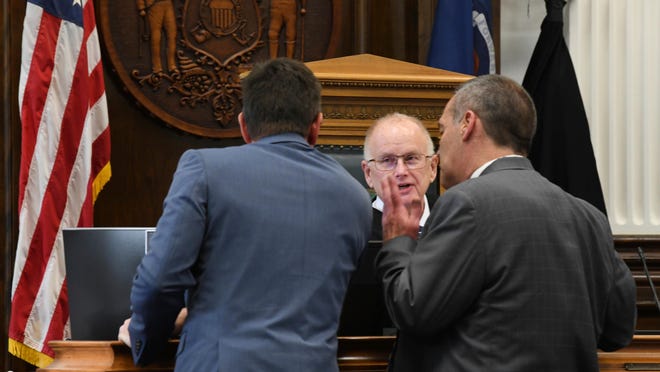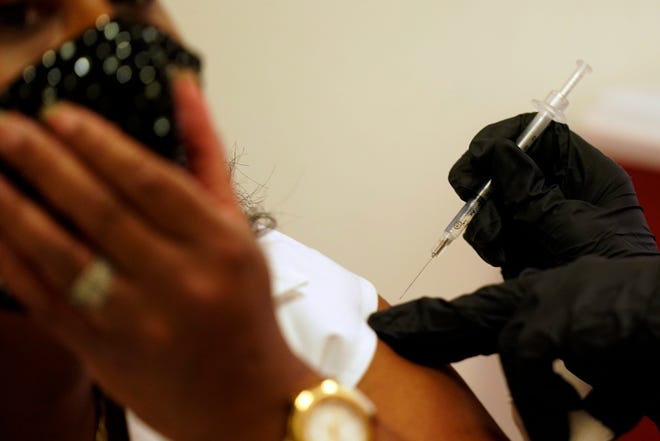
KENOSHA, Wis. — Jury selection was completed in a single day at the trial of Kyle Rittenhouse, the Illinois teenager charged with killing two people and wounding a third during protests last year after the police shooting of Jacob Blake.
The final 20-person panel – 12 jurors and eight alternates – came together Monday night after lawyers used their peremptory strikes to trim a panel of 34 prospective jurors. The final panel has 11 women and nine men, and one person of color.
The trial will continue Tuesday morning with opening statements before testimony begins. The trial is expected to last two weeks.
The case has provided a constant stream of intrigue, outrage and propaganda, in both mainstream and niche conservative media outlets where the defendant has been portrayed as a patriot and symbol of gun rights, as well as a self-defense hero and boy-next-door.
Rittenhouse is charged with intentional, reckless and attempted homicide, reckless endangerment and curfew violation. He’s also charged with possessing a firearm as a minor, which is a misdemeanor.
How it happened:A visual timeline of violence in Kenosha after police shooting of Jacob Blake
Kenosha County Circuit Judge Bruce Schroeder presides in his large second-floor courtroom. Masks are not required inside the Kenosha County Courthouse, and social distancing is not enforced. Schroeder set aside two weeks for the trial.
Rittenhouse's lawyers say he acted in lawful self-defense. Here's what to know about his trial:
Rittenhouse charged with multiple counts, including homicide
Rittenhouse faces five felonies, a misdemeanor and a curfew ticket from the events of Aug. 25, 2020. Using an AR-15-type rifle, he killed Joseph Rosenbaum, 36, and Anthony Huber, 26, and wounded Gaige Grosskreutz.
The most serious charge is first-degree intentional homicide in the fatal shooting of Huber, who prosecutors said was shot in the chest while trying to pull Rittenhouse's gun from him.
Rittenhouse is charged with endangering the safety of a reporter for The Daily Caller who was recording from nearby when Rosenbaum was shot and an unidentified man Rittenhouse shot at as the man tried to kick him.
Related:This is how jurors will be selected to serve in Kyle Rittenhouse's trial
Rittenhouse considered himself militia
Rittenhouse considered himself a militia member trying to protect life and property, according to videos, interviews and social media posts. He was 17 at the time of the shooting but has turned 18.
The night of the shooting, Rittenhouse said, he was armed with a rifle to protect a parking lot. Wisconsin law allows gun owners to carry their firearms in public, though it is unclear whether the Illinois 17-year-old would have been prohibited as a minor.
Neither side sought to have the trial elsewhere
Rittenhouse's trial started in Kenosha, Wisconsin, at 9 a.m. with jury selection.
In a typical criminal felony trial, most clerks of court will summon 30-60 people from the county as potential jurors, selected randomly from state drivers' license and ID card records.
For trials in cases that generate lots of publicity, it's not uncommon for defendants to seek a change of venue – to have the trial held in a different county or before jurors brought in from another county.
Neither side sought to have the trial elsewhere, knowing that potential jurors in almost any part of Wisconsin would be familiar with the Rittenhouse case.
Judge has sparked controversy
Schroeder is the longest-serving current judge in Wisconsin. He's become a polarizing national figure for his early decisions in the Rittenhouse trial.
Schroeder, 75, said last week the people shot by Rittenhouse could not be called "victims" – a term he routinely bans in his trials unless someone has been convicted of a crime against the person.
He prompted controversy after he quoted a racial slur on camera during online streaming of court proceedings last year.
Kyle Rittenhouse trial:Judge has sparked controversy, insists the case is not 'political'
How you can watch the proceedings
CourtTV, a streaming news site that used to be a cable channel, plans to cover the entire trial. Schroeder and county officials let CourtTV set up three cameras, and its audio and video will serve as the feed to other news outlets.
The trial will stream live – supplemented with CourtTV's own commentary – on CourtTV.com.
Reporters from the Milwaukee Journal Sentinel, part of the USA TODAY Network, will provide coverage, including via a live blog at jsonline.com.
Contributing: Gina Barton and Cary Spiva, Milwaukee Journal Sentinel; The Associated Press
Follow Bruce Vielmetti on Twitter at @ProofHearsay.










